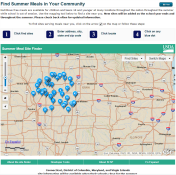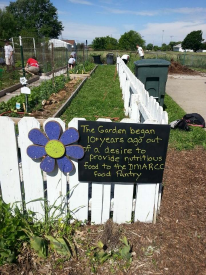June 2015
It’s hard to believe that summer is already upon us! In addition to heat and thunderstorms, this is the season of community gardens, summertime nutrition programs, and outdoor opportunities for Iowans to team up against hunger.
Looking forward to harvest, please save the date for the Ninth Annual Iowa Hunger Summit on Tuesday, October 13th at the Marriott in Downtown Des Moines. Free and open to the public, this annual event brings 600-800 Iowa leaders together to celebrate and inspire action against hunger. Online registration opens July 25th at www.iowahungersummit.org.
Do you have an idea for an afternoon workshop at the Iowa Hunger Summit? We are accepting workshop proposals online through July 10th at www.worldfoodprize.org/hsworkshop.
Thank you for all you do,
Stephen
Summer Food Service Program nourishes Iowa youth
 During the school year, more than 195,000 children receive free and reduced-price meals. The USDA Summer Food Service Program extends this investment in our children’s health by providing nutritious meals and snacks to low income children during the summer.
During the school year, more than 195,000 children receive free and reduced-price meals. The USDA Summer Food Service Program extends this investment in our children’s health by providing nutritious meals and snacks to low income children during the summer.
Families can locate summer meal sites by calling 1-866-3-HUNGRY (1-877-8-HAMBRE) or by visiting www.fns.usda.gov/summerfoodrocks.
While there are many summer serving sites across Iowa, they are currently reaching only 10% of eligible children. There is a great need for additional schools and community based organizations to serve as program partners.
For more information, or to explore the possibility of becoming a program partner, contact the Iowa Department of Education program consultant Stephanie Dross at stephanie.dross@iowa.gov or 515-281-4760.
Gardens and food pantries are sharing the harvest
 Across Iowa, school, faith-based and community gardens are partnering with local food pantries to provide their communities with increased access to healthy, nutritious food. Organizations such as Cultivate Iowa, Food Corps, and Iowa Interfaith Power and Light are helping gardens to get started.
Across Iowa, school, faith-based and community gardens are partnering with local food pantries to provide their communities with increased access to healthy, nutritious food. Organizations such as Cultivate Iowa, Food Corps, and Iowa Interfaith Power and Light are helping gardens to get started.
Newer gardens join a variety of established gardens, including the 12-year old garden at Saint Paul Presbyterian Church in Johnston, which produced 1200 pounds of produce during the 2014 growing season. All 1200 pounds were distributed locally to people in need through collaboration with a food pantry operated by the Johnston Partnership for a Healthy Community.
Beginning last year, the church also shared produce through two Pop-Up Markets at the Johnston AHEPA complex where low-resource senior citizens live. Many residents of the complex do not have transportation and have limited incomes. This effort brought the produce directly to their site and was offered free of charge. There are plans to do that again this summer.
The Saint Paul Presbyterian Church garden thrives off of the combined efforts of the congregation and the wider community. Collaborators include the Church Garden Committee, Sunday school students, youth groups, service organizations, and other churches that provide volunteers to care for the garden.
The Community Garden has been blessed with several grant awards that allowed for the expansion:
- In 2013, they were awarded a United Way mini-grant to install a water source in the garden area
- In 2014, Hy-Vee provided additional funding to install a drip irrigation system
- In 2014, Johnston High School 9th grader Sydney Hedgepeth wrote a grant request while attending the Reformed Church of America (RCA) Conference in Colorado that was chosen out of 100 entrees and allowed for the addition of two composters that are operational for the 2015 growing season
Church garden organizers share the following insights from their experience:
- We simply felt called to do it and it felt right, that we were pleasing the Lord.
- Gardens, like life are messy. A lot of unforeseen problems come up, and you just have to have faith that it will work out.
- Church ladies don't like to ask for help – we are supposed to be the givers. But in the asking we have enjoyed new friends and gained a lot more insight into this project than if we had tried to do it all alone.
- Gardens are like kitchens – if you are there working someone nearly always wanders in to see what you are doing or to talk.
For more information about the Saint Paul Presbyterian Church garden and its collaboration with the Johnston Partnership for a Healthy Community, please join their Garden to Table Celebration on June 20 or contact Ms. Kelly Renfrow at president@johnstonpartnership.org or 515-868-1357.
Photo credits: Top: Summer Food Service Program sites near Clinton, Bottom: St. Paul Presbyterian Garden

